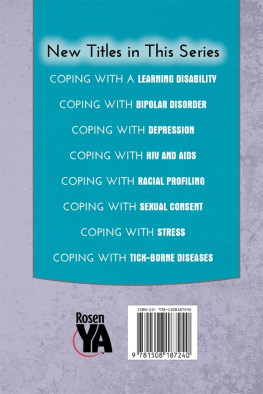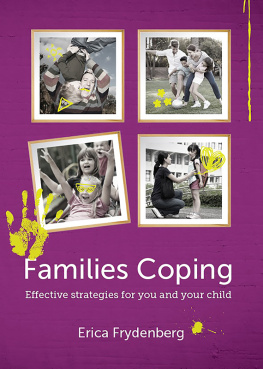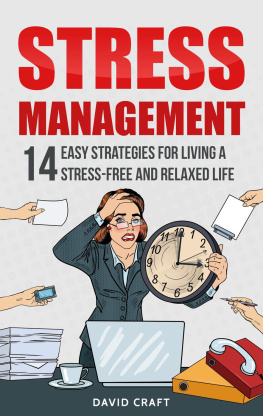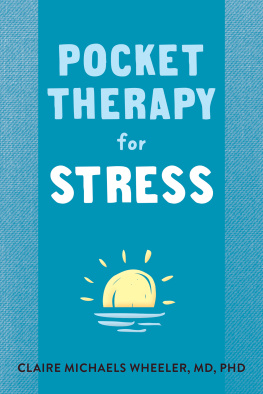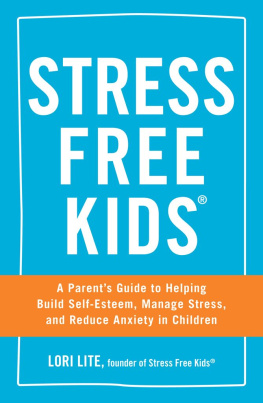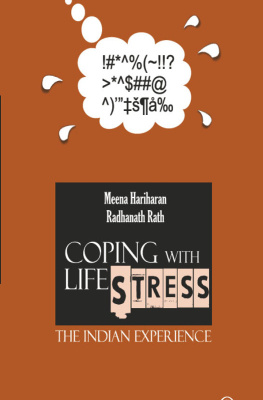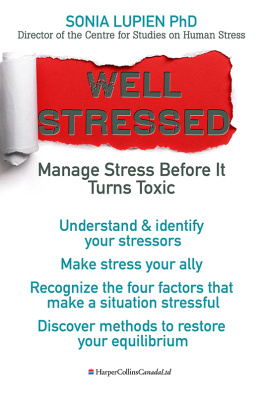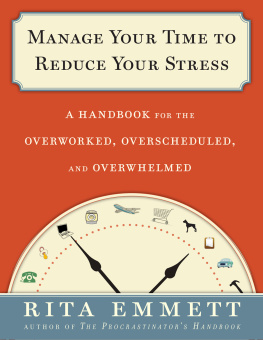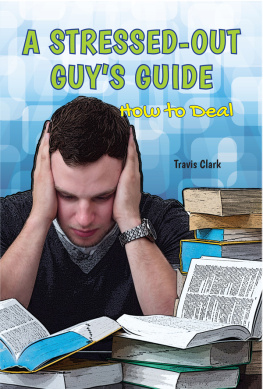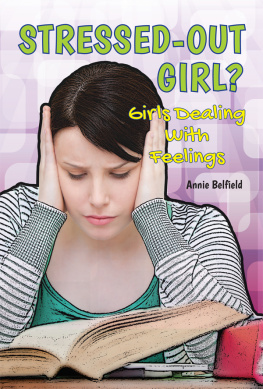
Published in 2020 by The Rosen Publishing Group, Inc.
29 East 21st Street, New York, NY 10010
Copyright 2020 by The Rosen Publishing Group, Inc.
First Edition
All rights reserved. No part of this book may be reproduced in any form without permission in writing from the publisher, except by a reviewer.
Library of Congress Cataloging-in-Publication Data
Names: Thompson, Elissa, author. | Bickerstaff, Linda, author.
Title: Coping with stress / Elissa Thompson and Linda Bickerstaff.
Description: New York : Rosen Publishing, 2020 | Series: Coping | Audience: Grades 712. | Includes bibliographical references and index.
Identifiers: LCCN 2018050657| ISBN 9781508187257 (library bound) | ISBN 9781508187240 (pbk.)
Subjects: LCSH: Stress in adolescenceJuvenile literature. | Stress management Juvenile literature.
Classification: LCC BF724.3.S86 T46 2019 | DDC 155.9/042dc23
LC record available at https://lccn.loc.gov/2018050657
Manufactured in the United States of America
CONTENTS
INTRODUCTION
I m so stressed!
Growing up can be stressful. Being a teen today, there is school to think about, then friendships and romantic relationships, then social mediaplus life beyond high school to consider.
Teens may struggle with stress and anxiety, like Jake. He told the New York Timess Benoit Denizet-Lewis he would worry about failing a quiz, which would snowball. Then Ill get a bad grade in the class, I wont get into the college I want, I wont get a good job and Ill be a total failure.
Theres always one more activity, one more A.P. class, one more thing to do in order to get into a top college, Suniya Luthar, a professor of psychology at Arizona State University, told Denizet-Lewis. Kids have a sense that theyre not measuring up. The pressure is relentless and getting worse.
Concern about the future can play a big role in teen stress, like for Alison Heyland, who told Time magazines Susanna Schrobsdorff, I feel like it really is less realistic for you to go after your dream job today. Youre more apt to go do a job that you dont really like because it pays better and youll be in less debt.

Many teens say school is a big cause of stress in their lives. There is a lot of worry about getting into college, which can cause added pressure to do well on papers and exams.
All these worries can be difficult to handle. Its hard to describe the stress, Tommy La Guardia told Times Schrobsdorff. Im calm on the outside, but inside its like a demon in your stomach trying to consume you. Tommy doesnt like to worry his mom, though, so he doesnt like to talk about his stress with her. I dont want to make it someone elses problem.

College life can also be a cause of stress, as living away from home for the first time, combined with new responsibilities, can weigh on students.
Add to this that much of what teens are dealing with today is new, so adults dont always know how to help. Parents didnt have smart phones growing up there was no Facebook or Instagram, cyberbullying or Internet trolls, which can definitely contribute to teen stress.
If you wanted to create an environment to churn out really angsty people, weve done it, Janis Whitlock, director of the Cornell Research Program on Self-Injury and Recovery, told Times Schrobsdorff. Its that theyre in a cauldron of stimulus they cant get away from, or dont want to get away from, or dont know how to get away from, she said.
All of this means that stress and anxiety rates are on the rise. The New York Times reported that the Higher Education Research Institute at UCLA found 41 percent of incoming freshman feel overwhelmed by their workloads, which is more than double the number of overloaded students in 1985.
Its important to remember that everyone gets stressed sometimes. Its a natural physiological reaction, and there are ways to control those overwhelming, panicked feelings. By understanding what happens in the body when stressedboth good and badyou can decipher what is going on inside you, learn positive coping mechanisms, and discover what stressors affect you and how to handle them. Avoiding negative stimuli and learning selfcare can also help.

Smartphones can be very stressful for teensespecially those who arent good at setting limits on usage. Looking at a smartphone at night can impede sleepanother stressor.
Lets get destressed!
CHAPTER ONE
Stress and the Body
S tress happens to everyone every day. But this is not necessarily a bad thing! Stress reactions can help one respond to changes in our environment each day. But too many stressors can be overwhelming. You may wind up feeling stressed out.
Stress 101
The word stress was coined when Hans Selye and another physician, Walter Bradford Cannon, began to publish the results of their research efforts back in the late ninteenth to early twentieth centuries.
In his autobiography, The Way of an Investigator, Dr. Cannon theorized that when presented with severe stress, the body shuts down certain functions, like digestion, which arent needed in life-or-death situations. By doing this, blood can move to parts of the body, including the brain, heart, lungs, and muscles, where it is needed immediately. Thus, the concept of the fight-or-flight response was born.
Dr. Stress
Dr. Hans Selye was known as Dr. Stress in medical circles because of his contributions to understanding the effects of stress on humans. Dr. Selye differentiated between good stress and bad stress.
Good stress , which he called eustress, is comprised of bodily responses to stressors that help protect one in times of danger. Eustress gears up the body to study for exams, to meet deadlinesbasically, to stay on ones toes in order to meet lifes challenges. Eustress allows the body to return to an unstressed state within a short interval of time.
Bad stress , which Dr. Selye called distress, is the result of too much of a good thing. Stress responses are automatic, and one cant do anything to stop them from occurring. If a person is constantly being stressed, his or her bodys stress reactions will begin to overlap. Temporary bodily changes, like elevated blood pressure and heart rate, may become present all the time. This can contribute to the development of very significant health problems, including heart attacks and strokes.
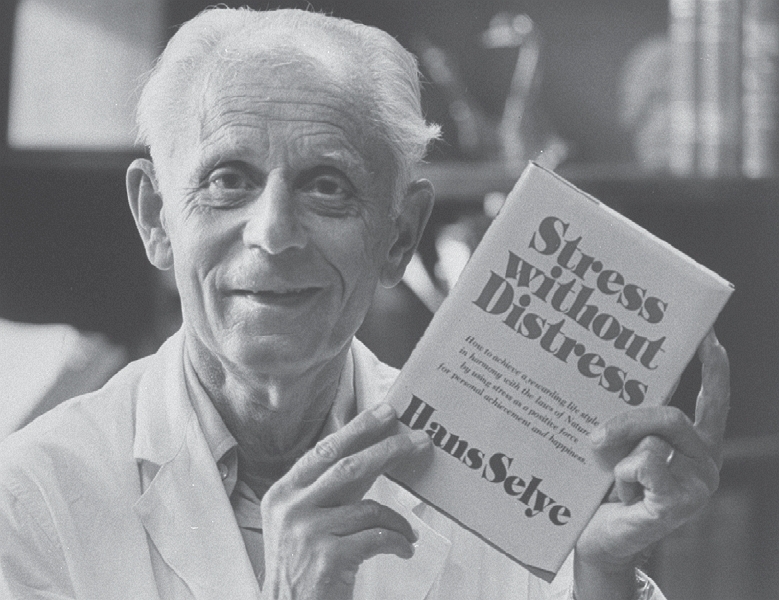
Dr. Hans Selye is considered the father of the field of stress. He was a respected endocrinologist whose contributions to the study of stress still help researchers today.
How Stress Affects the Body
Its impossible to go through an entire day without encountering stressors and reacting to them. Regardless of what the stressor is, the body will react the same way every time it is stressed. Heres what happens:
Heart rate, respiratory rate, and blood pressure increase. At the same time, blood flow to the skin, digestive system, and kidneys decreases. As a result, more blood is shunted to organs, like the lungs, brain, and large muscle groups, which really need it in emergency situations. When blood flow is increased to the brain, its ability to respond quickly to stressors improves. Increased blood flow to large muscle groups enables one to flee from a perceived danger.
Next page
